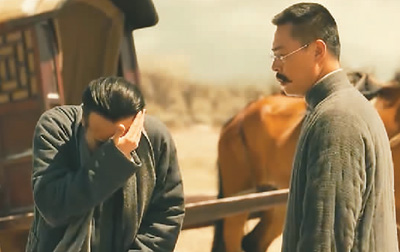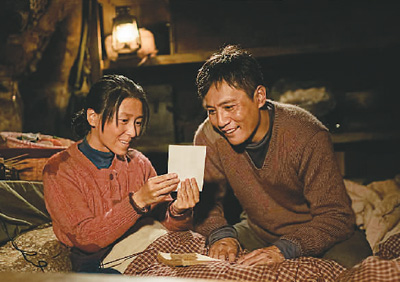
In recent years, with the change of creative voice and artistic perspective, red stories in film and television works have paid more and more attention to the exploration of emotional elements. Emotion is the important origin of art, and art is the symbolic creation of emotion. To tell Chinese stories with love and force, the first thing is to "use love", to inject emotional logic and emotional power into the red story, to use emotion to promote the narrative, shape the characters, sublimate the theme and realize the value guidance. The success of film and television works such as "The Age of Awakening" and "1921" is precisely because of the lofty and sincere feelings of the works, which have made the audience have a strong empathy and resonance.
Drive the narrative with emotion
The red stories in film and television works involve major historical facts such as the history of the party, the history of new China, the history of reform and opening up, and the history of socialist development, as well as macro propositions such as values, truth and belief. In order to let these serious and heavy histories and concepts enter the hearts of ordinary people, we must tell stories with a voice and perspective that the people are familiar with and love, discover greatness in the ordinary, and start from the basic emotions of people, and tell the big truth. Human. Tang Xianzu, a dramatist in the Ming Dynasty, said that "dreams become dreams and dramas become dramas because of feelings". Emotions are the logical starting point for the development of many stories. In any age, people's emotional appeals and emotional experiences are always the same. Therefore, using the power of emotion to drive the narrative can make the red story more tense, more real, more logical and convincing.

Shape characters with emotion
Emotion is the most basic psychological activity of human beings, and it is the experience of human beings on whether objective things meet their own needs. In human memory, emotional memory is the most mellow and lasting. If the characters in the red story are to be vivid, they must have abundant emotions, let the characters show a lively texture of life, and let interesting souls form a passionate collision, so that the story will look good and the characters will be three-dimensional. Judging from historical experience, it is difficult for a person with little affection and lack of interest to become an outstanding revolutionary, builder and struggler, and most of the trend-setters in each era have fiery emotions and inner strength. They "grow too much to hide their tears, and mourn how difficult the people's life is". They "hope that everyone will be full and warm, and they will spare no effort to get out of the mountains and forests." in the process of. It can be said that emotion is an important engine for many revolutionary pioneers and heroic figures to choose the path of life and determine the coordinates of their beliefs.
Praise Faith with Emotions
The artistic purpose of the red story is to lead by value. Interpreting the beauty of faith and the beauty of sublime requires devotion to emotion. If an emotional connection can be established between human nature and faith, that kind of strength and certainty will be unstoppable. Only by putting the creator's own emotions into stories and characters, telling stories with true feelings, and establishing characters with true feelings, can red stories truly have artistic appeal and achieve value guidance.
Red stories have a great power, whether they are revolutionary leaders, heroic figures or ordinary strugglers, they all dedicated "clear love" to China. In the red stories of the new era, the praise of struggle, the eulogy of truth, and the praise of faith are inseparable from sincere and mellow emotions. Film and television creators should start from emotion, cultivate artistic consciousness and cultural consciousness, and strive to realize the innovative expression of Chinese culture and Chinese spirit.
(The author is a professor and doctoral supervisor of the School of Drama, Film and Television, Communication University of China. This article was originally published in the seventh edition of "People's Daily Overseas Edition" on July 1, 2022)
Drive the narrative with emotion
The red stories in film and television works involve major historical facts such as the history of the party, the history of new China, the history of reform and opening up, and the history of socialist development, as well as macro propositions such as values, truth and belief. In order to let these serious and heavy histories and concepts enter the hearts of ordinary people, we must tell stories with a voice and perspective that the people are familiar with and love, discover greatness in the ordinary, and start from the basic emotions of people, and tell the big truth. Human. Tang Xianzu, a dramatist in the Ming Dynasty, said that "dreams become dreams and dramas become dramas because of feelings". Emotions are the logical starting point for the development of many stories. In any age, people's emotional appeals and emotional experiences are always the same. Therefore, using the power of emotion to drive the narrative can make the red story more tense, more real, more logical and convincing.

"The Age of Awakening" stills
For example, the TV series "The Age of Awakening" uses the simplest emotions and the lowest perspective to explain the reasons why revolutionary pioneers are willing to participate in the revolution even if they throw their heads and blood. When Chen Duxiu in the play saw the tragic scene of starvation and countless victims by the Haihe River in Tianjin, and the dying old China that was about to collapse, he couldn't help crying, vowing to make a good life for the Chinese people. To live, to gain human dignity and to establish a proletarian party. It was a cry from the bottom of my heart that established the heart for the world and the life of the people, so there is a historical story of "South Chen and Bei Li, meet to build the party".
"1921" stills
There is a scene in the movie "1921": On a precipitous winter day, Yang Kaihui snuggled up in Mao Zedong's arms to watch the fireworks set off. She asked Mao Zedong: Life is so short that the dawn of victory may not be seen, so is there any meaning to today's efforts? Mao Zedong said firmly and affectionately: Of course! We cannot choose our own country, we cannot choose our own family, but we can choose our own ideals. Fighting for ideals and devoting yourself to truth is worth it, even if you get nothing. This revolutionary couple has light in their eyes and love in their hearts, and the love based on common beliefs is more loyal and great. When Yang Kaihui died at the end of the film, the camera flashed back to the scene where she and Mao Zedong said goodbye at the dock. She used her life to interpret the power of faith and love. This way of driving the narrative with emotion is more appealing to young audiences.Shape characters with emotion
Emotion is the most basic psychological activity of human beings, and it is the experience of human beings on whether objective things meet their own needs. In human memory, emotional memory is the most mellow and lasting. If the characters in the red story are to be vivid, they must have abundant emotions, let the characters show a lively texture of life, and let interesting souls form a passionate collision, so that the story will look good and the characters will be three-dimensional. Judging from historical experience, it is difficult for a person with little affection and lack of interest to become an outstanding revolutionary, builder and struggler, and most of the trend-setters in each era have fiery emotions and inner strength. They "grow too much to hide their tears, and mourn how difficult the people's life is". They "hope that everyone will be full and warm, and they will spare no effort to get out of the mountains and forests." in the process of. It can be said that emotion is an important engine for many revolutionary pioneers and heroic figures to choose the path of life and determine the coordinates of their beliefs.

"Island Keeper" stills
In recent years, more and more film and television works have focused on highlighting the true temperament of the characters, giving them distinct personality and unique charm. In the movie "Island Keeper", Wang Jicai and his wife were in love with each other and engraved their love on the remote islands and reefs. Li Dazhao in the movie "Revolutionary" kisses his children lovingly, as if seeing China's future. The scene of Li Da and Wang Huiwu's newly married Yaner in the movie "1921" added warmth and romance to the revolutionaries in the harsh environment. Whether there is emotional richness and sense of hierarchy when shaping a character is also an important criterion for testing an actor's artistic skill. In the movie "1921", when He Shuheng was asked why he participated in the revolution, he said: The reason for my participation in the revolution is very simple, that is, I hope that one day I can raise my head and straighten my back. I want to be free to see the world I want to see. When Zhang Songwen, played by He Shuheng, performed, from the initial calm to the emotional turbulence, and then to tears that could not help but flow, the audience's emotions were gradually brought into the dramatic situation and deeply moved.Praise Faith with Emotions
The artistic purpose of the red story is to lead by value. Interpreting the beauty of faith and the beauty of sublime requires devotion to emotion. If an emotional connection can be established between human nature and faith, that kind of strength and certainty will be unstoppable. Only by putting the creator's own emotions into stories and characters, telling stories with true feelings, and establishing characters with true feelings, can red stories truly have artistic appeal and achieve value guidance.

"Decisive Moment" stills
For example, in the movie "Decisive Moment", the five secretaries gathered together. Ren Bishi, who was seriously ill, played the violin for Mao Zedong, Zhou Enlai, Zhu De and Liu Shaoqi before going to the Soviet Union for medical treatment to express their farewell feelings. All the people present were moved to tears. Decades of comrade-in-arms friendship is fully revealed in the melodious sound of music and in historical flashbacks. In the movie "1921", there is a scene where representatives of the National Congress of the Communist Party of China collectively read the "Communist Manifesto". Those revolutionary youths are so passionate, their emotions are so passionate, their ideals are so fiery, they are like that round of gushing and radiant. Chaoyang, no one can stop it.Red stories have a great power, whether they are revolutionary leaders, heroic figures or ordinary strugglers, they all dedicated "clear love" to China. In the red stories of the new era, the praise of struggle, the eulogy of truth, and the praise of faith are inseparable from sincere and mellow emotions. Film and television creators should start from emotion, cultivate artistic consciousness and cultural consciousness, and strive to realize the innovative expression of Chinese culture and Chinese spirit.
(The author is a professor and doctoral supervisor of the School of Drama, Film and Television, Communication University of China. This article was originally published in the seventh edition of "People's Daily Overseas Edition" on July 1, 2022)
Related Posts